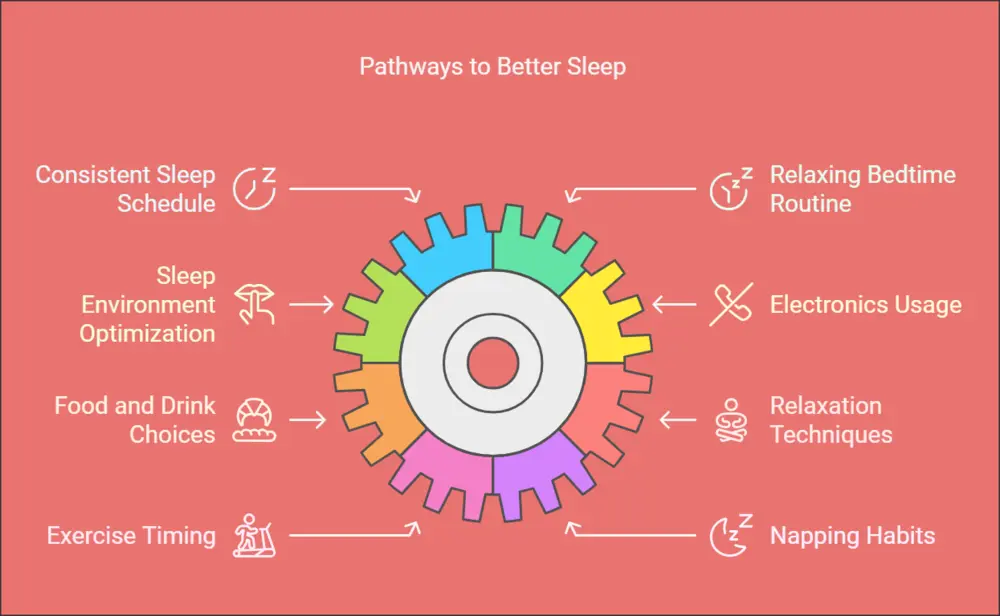We all know the feeling—tossing and turning all night, watching the clock tick away, and waking up more tired. How to sleep better and faster is a question many of us find ourselves asking, especially when life gets hectic. Don’t panic; you’re not alone in this struggle. Millions of people face sleep problems every night, and it’s taking a toll on their health, mood, and energy levels. But what if I told you that the answer isn’t always inexpensive pills or fancy gadgets?
Natural, low-cost solutions can be incredibly effective in helping you get the restful sleep you deserve. Whether you adjust your bedtime routine, tweak your environment, or try simple relaxation techniques, there are plenty of proven ways to sleep better and faster without breaking the bank.
In this article, I will share actionable, science-backed tips that can help you sleep like a baby, naturally and quickly. So, if you’re ready to stop counting sheep and start catching some real Zzzs, keep reading!
The Science of Sleep: Why Quality Sleep Matters
Why does a good night’s sleep feel like hitting the reset button for your body and mind?
Quality sleep plays a massive role in how you feel and function daily. Sleep isn’t just about resting—it’s about giving your body the chance to repair and recharge.
There are different stages of sleep, but deep sleep (also known as core sleep) is the most important. During this stage, your body does most of its healing and recovery. Your muscles repair, your brain clears toxins, and your immune system boosts. Without enough deep sleep, you’re likely to feel groggy, sluggish, and less focused during the day.
Poor sleep affects more than just how you feel in the morning. It can impact your physical and mental health in significant ways. A lack of sleep can weaken your immune system, making you more likely to get sick. It can also mess with your mood, leaving you irritable or stressed. On top of that, your brain’s ability to think clearly and remember things takes a hit. So, if you’ve ever felt foggy or forgetful after a lousy night’s sleep, now you know why!
In short, sleep isn’t just a luxury—it’s a necessity. Getting enough sleep can make all the difference in how you live your life.
What Steps Should You Follow to Get Better Sleep Naturally

1. Establish a Consistent Sleep Schedule
Have you ever tried sleeping at different times each night and wondered why it is so hard to fall asleep?
That’s because our bodies love routine. Going to bed and waking up simultaneously daily helps your body’s internal clock, called the circadian rhythm, stay in sync. When your circadian rhythm is on track, falling asleep and waking up becomes much more manageable.
A consistent sleep schedule can significantly affect how well you sleep. When you stick to a regular bedtime, your body starts to expect sleep. This makes falling asleep quicker and feeling more rested in the morning. It also helps you wake up without feeling groggy.
If your schedule is all over the place, don’t worry! You can gradually adjust your sleep times. Try going to bed 15 minutes earlier each night or waking up a bit later until you’re on a schedule that works for you. Slowly making these changes helps your body adapt without the shock of a sudden change.
2. Create a Relaxing Bedtime Routine
Do you have a nightly routine or crash into bed and hope for the best?
Believe it or not, having a relaxing bedtime routine can significantly affect how quickly you fall asleep. When you wind down before bed, you tell your body it’s time to sleep, not stay alert and active.
Try calming activities like reading a good book, stretching gently, or listening to peaceful music. These relaxing actions help your mind and body slow down, making it easier to drift off to sleep. A warm bath or shower right before bed can also help you relax by raising your body temperature, which drops when you get out. This drop in temperature signals to your brain that it’s time to sleep.
Creating a calming routine each night helps train your body to recognize when it’s time to sleep, making the process smoother and faster. Plus, you’ll wake up feeling more refreshed, knowing that you took the time to care for yourself before bed.
3. Optimize Your Sleep Environment
Is your bedroom a sleep-friendly zone? If not, it’s time to make some simple changes to create the perfect environment for rest because it’s an integral part of sleeping better and faster naturally. Here’s how:
- Make Your Bedroom Dark: Darkness is one of the most important things for a good night’s sleep. When it’s dark, your body produces melatonin, a hormone that helps you fall asleep. If your room is too bright, your body won’t make enough melatonin, and you might have trouble sleeping. Try using blackout curtains or an eye mask to keep the light out. The darker, the better!
- Control the Temperature: Did you know the right room temperature can help you sleep better naturally? A cool room is ideal for sleep, but not too cold! The best temperature is 60–67°F (15–20°C). If it’s too hot or cold, it can make it harder to fall or stay asleep. Try adjusting your thermostat or using lighter blankets for a more comfortable rest.
- Choose a Comfortable Mattress: Consider how much time you spend lying on your mattress. It is important to have one that gives you the right amount of support and comfort. A good mattress helps keep your body aligned so you wake up feeling refreshed, not sore. If your mattress is old or uncomfortable, it might be time to invest in a new one that supports your body correctly.
- Limit Noise: Do you have trouble sleeping because of noise? Whether it’s traffic, a barking dog, or the hum of a neighbor’s TV, noise can disrupt your sleep. Try using a white noise machine or earplugs to block out unwanted sounds. Soft sounds, like ocean waves or rain, can help you relax and fall asleep faster.
4. Avoid Electronics Before Bed
Are you guilty of scrolling through your phone right before bed? That habit might be hurting your sleep. Here’s why:
Blue Light and Sleep: Blue light from screens—like your phone, tablet, or TV—can mess with your sleep. It blocks melatonin production, making it harder for your body to get sleepy. Using electronics too close to bedtime can delay your sleep and make it harder to fall asleep.
Tips for Reducing Screen Time: To give your body a better chance at sleep, try cutting back on screen time at least one to two hours before bed. Instead of watching TV or scrolling on your phone, try something relaxing like reading a book, journaling, or listening to calming music. If you can’t avoid your phone, switch it to night mode—this reduces the blue light and makes it easier on your eyes.
Making these changes helps your body relax and prepare for sleep, so you can naturally get faster sleep and rest easy all night long!
5. Be Mindful of Food and Drink
What you eat and drink before bed can significantly impact how well you sleep. Let’s look at some simple things to keep in mind:
Avoid Caffeine and Alcohol Before Bed
Did you know drinking coffee or tea in the evening can affect your sleep?
Caffeine is a stimulant that keeps you awake and can stay in your system for hours. Even if you’re tired, caffeine can stop you from falling into deep, restful sleep. It’s best to avoid caffeine at least 6 hours before bed.
Alcohol might make you feel sleepy at first, but it can mess with your deep sleep stages. You might fall asleep quickly, but it won’t be quality sleep, and you’ll likely wake up feeling groggy.
Eat Sleep-Friendly Foods
Some foods can help you sleep better! Try having a banana before bed. They contain magnesium, which helps relax your muscles and calm your body. Cherries are great, too, because they have melatonin, the sleep hormone your body needs. Almonds are rich in magnesium and healthy fats that can help your body sleep more soundly. Eating a light snack with these foods can give your body the boost it needs for a peaceful night’s sleep.
Essential Oils for Sleep
Natural remedies like lavender and chamomile essential oils can also promote relaxation. These oils have been shown to help lower stress and anxiety, making it easier to wind down before bed. You can use a diffuser to spread the scent through your room or put a few drops on your pillow for a calming effect.
6. Incorporate Relaxation Techniques
Sometimes, your mind and body need extra help to relax before sleep. Here are some techniques to help you unwind and prepare for a restful night:
Breathing Exercises
Try the 4-7-8 breathing method to calm your nervous system. It’s simple: inhale for 4 seconds, hold your breath for 7 seconds, and then exhale slowly for 8 seconds. This technique helps reduce stress and makes it easier for your body to transition into sleep mode. It’s a great tool when feeling anxious or restless before bed.
Meditation and Progressive Muscle Relaxation
Meditation or progressive muscle relaxation is another excellent way to prepare for sleep. Meditation helps clear your mind, making letting go of the day’s stress easier. Progressive muscle relaxation involves tensing and relaxing different muscle groups, allowing you to release physical tension. Both techniques can lower your stress levels and ease you into a peaceful sleep.
Guided Sleep Meditation
If you’re new to meditation, you can use an app or recordings for guided sleep meditation. These apps lead you through relaxation exercises and calming stories that make it easier to fall asleep. Listening to a guided meditation can be like having a calming friend with you, helping you relax and prepare for sleep.
Remember, by practicing these techniques regularly, you can train your body and mind to relax more quickly, helping you fall asleep faster and enjoy better-quality sleep.
7. Exercise During the Day (But Not Too Close to Bedtime)
Want to sleep better? Exercise might be the secret for you!
Regular physical activity helps you sleep faster and more deeply. Moving your body burns off extra energy and stress, making it easier to relax at night. Plus, exercise helps regulate your body’s sleep-wake cycle so you can fall asleep more easily.
You don’t have to do intense workouts to see the benefits. Simple exercises like walking, yoga, or light cardio (biking or dancing) can make a big difference. These activities get your blood flowing and your muscles moving, which helps you sleep soundly when it’s time for bed.
But there’s a catch—don’t exercise too late in the evening! Working out too close to bedtime can make it harder to fall asleep. When you exercise late, your heart rate stays up, and your body feels more awake than ready for sleep. Try to finish exercising at least three hours before going to bed so that your body has time to wind down.
8. Eliminate Naps
Do you love taking a nap in the afternoon? While naps can be refreshing, they can sometimes interfere with nighttime sleep, especially if they’re too long or too late in the day.
Napping for a long time (more than 30 minutes) or napping late in the afternoon can make it harder to fall asleep at night. Your body might not feel tired enough when bedtime comes around.
If you need a break during the day, try doing something other than napping, like taking a short walk or doing light stretching. These activities can give you a mental refresh without ruining your nighttime sleep. If you must nap, try to keep it under 30 minutes and do it earlier in the day, ideally before 3 p.m. This way, your body will be tired and ready for sleep when nighttime comes.
9. Track Your Sleep Profile
Have you ever wondered why you’re not sleeping well? Sometimes, the answer lies in your own habits. One of the best ways to find out what’s affecting your sleep is to track your sleep profile. This means paying attention to how much sleep you’re getting when you’re sleeping and what might be keeping you awake.
You can use a sleep tracker or keep a sleep journal to monitor your patterns. Like an app or wearable device, a sleep tracker tracks how long you sleep and how much time you spend in each sleep stage. You can also get down your daily routine in a sleep journal. Note things like what time you went to bed, what you ate or drank before sleep, and how you felt when you woke up. This can help you see if certain habits—like drinking coffee late or using your phone before bed—are worsening your sleep.
Once you understand your sleep profile, you can make changes that work for you. You may realize you need to cut back on screen time or that you’re not getting enough exercise during the day. Understanding your sleep habits is a significant first step toward improving your rest.
When to Seek Professional Help
What if you’ve tried everything but still can’t sleep well? Sometimes, sleep problems can be more serious than just needing a better bedtime routine. Notice any signs of a sleep disorder, like persistent insomnia (the inability to fall or stay asleep) or sleep apnea symptoms (like snoring loudly or feeling tired even after a whole night of sleep). It might be time to seek professional help.
A doctor or sleep specialist can help diagnose underlying sleep problems and recommend treatments. If natural remedies aren’t helping, don’t hesitate to reach out for help. Proper treatment for sleep disorders can help you sleep better and improve your overall health. Good sleep is essential, and asking for help when needed is okay!
Conclusion
To sleep better and faster, there are simple, natural strategies you can start using today. First, set a regular sleep schedule to help your body’s internal clock. Create a relaxing bedtime routine to signal your brain that it’s time to wind down. Ensure your bedroom is dark, calm, and quiet, and avoid electronics before bed. Be mindful of what you eat and drink, and consider using relaxation techniques like deep breathing or meditation to calm your mind.
Want more tips for better health and wellness? Subscribe to our newsletter for regular updates and expert advice delivered to your inbox.
And don’t forget to grab our free downloadable sleep journal. It’s the perfect tool to help you track your sleep habits, pinpoint areas for improvement, and make better decisions for your health. Start your journey to better sleep today!



